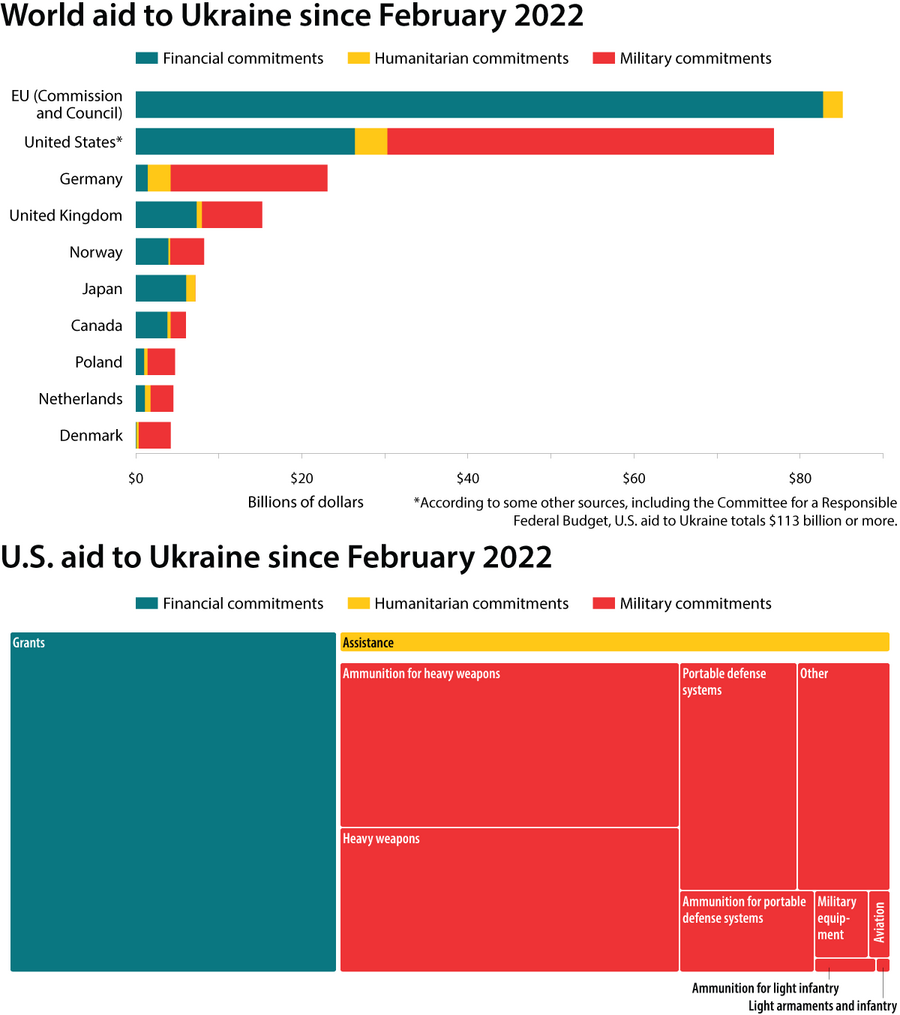Zelenskyy asks Congress for more aid. This time, it’s a tougher sell.
Loading...
| Washington
Nine months after he got a standing ovation before a joint session of Congress, Ukrainian President Volodymyr Zelenskyy returned today – under notably different circumstances – to make a pitch for more U.S. aid.
Aware that America’s enthusiasm for the war effort had eroded significantly, President Zelenskyy said Ukraine was making progress and using U.S. aid effectively, but that further support was necessary to protect the global world order.
Why We Wrote This
The Ukrainian president’s U.S. visit comes as Congress heads toward a possible shutdown and 55% of Americans oppose additional aid to Ukraine.
A strong bipartisan contingent of senators, along with President Joe Biden, agrees with him. If Russian President Vladimir Putin wins in Ukraine, they argue, his next target will be a NATO member – which America is treaty-bound to protect. That could draw U.S. forces into a direct conflict with Russia.
But the timing couldn’t have been worse. With funding for the U.S. government set to run out Sept. 30, Congress is locked in a stalemate over spending – and appears to be heading for a shutdown. Lawmakers, mostly on the GOP side, are balking at spending taxpayer dollars on a country that, 19 months into the fighting, lacks a clear path to victory and has a notorious history of corruption.
“I just don’t have much confidence that our money is being well spent,” says GOP Sen. Roger Marshall of Kansas.
Nine months after he got a standing ovation before a joint session of Congress, Ukrainian President Volodymyr Zelenskyy returned today – under notably different circumstances – to make a pitch for more U.S. aid.
Aware that America’s enthusiasm for supporting the war effort had eroded significantly, President Zelenskyy urged the U.S. to stay the course. According to senators who attended the closed-door briefing, he said Ukraine was making progress and using U.S. aid effectively, but that further support was necessary to protect the global world order.
Sen. Chris Murphy of Connecticut, a Democrat on the Foreign Relations Committee, summed up Mr. Zelenskyy’s argument as: “We have lived up to our end of the bargain, and we hope you see that and don’t choose this inflection point to abandon us.”
Why We Wrote This
The Ukrainian president’s U.S. visit comes as Congress heads toward a possible shutdown and 55% of Americans oppose additional aid to Ukraine.
A strong bipartisan contingent of senators, along with President Joe Biden, agree with the Ukrainian leader. If the U.S. doesn’t help Ukraine against Russian President Vladimir Putin’s invasion, they argue, his next target will likely be a member of NATO – which America is treaty-bound to protect. And that could draw U.S. forces into a direct conflict with Russia.
“It’s really pay now – or pay a lot more later to stop Putin,” says Democratic Sen. Richard Blumenthal of Connecticut, who sits on the Armed Services Committee and has visited Ukraine four times.
But the timing couldn’t have been worse for President Zelenskyy’s in-person request. With funding for the U.S. government set to run out Sept. 30, Congress is locked in a stalemate over spending – and appears headed for a government shutdown. Amid ballooning deficits and record-high national debt, Republicans are scrutinizing every dollar in proposed budgets for domestic priorities. And more lawmakers, mostly on the GOP side, are balking at spending taxpayer dollars on a country that, 19 months into the fighting, lacks a clear path to victory and has a notorious history of corruption.
Mr. Zelenskyy’s firing of all six of Ukraine’s deputy defense ministers shortly before his visit, after sacking the defense minister himself earlier this year, was broadly seen as an effort to clean house.
A U.S. government oversight effort involving 20 different organizations said in a March report that despite receiving 189 complaints alleging misconduct involving U.S. aid to Ukraine, investigations had “not substantiated significant waste, fraud, or abuse.” However, it also noted that it was difficult to conduct “end-use monitoring” because of the lack of U.S. personnel in Ukraine. Senate Republicans are pushing to create a special inspector general position to oversee Ukraine aid.
“I just don’t have much confidence that our money is being well spent,” says GOP Sen. Roger Marshall of Kansas, who supported the initial U.S. aid package after Russia’s February 2022 invasion. Overall, the U.S. has appropriated $113 billion – only about 0.5% of GDP but far more than he and his colleagues have proposed spending to secure the southern border, an issue he says matters more to his constituents.
“Until we have a plan to secure the southern border, you can count me out for any more funding for Ukraine,” said Senator Marshall, one of six GOP senators and 23 House Republicans to sign a letter to the Biden administration today opposing its request for an additional $24 billion.
As he met with Mr. Zelenskyy this afternoon, Mr. Biden announced a new $325 million military aid package, which is to be drawn from existing Pentagon inventory and thus does not need congressional approval.
In the early days of the war, Mr. Zelenskyy’s courage in staying in Kyiv even as top U.S. military and intelligence officials predicted it would soon fall to Russia earned him great respect – and strong bipartisan support for two initial rounds of aid, at $13.6 billion and $40 billion respectively.
But a year and a half later, with estimated war deaths exceeding 150,000 and a major Ukrainian counteroffensive failing to make much ground, the initial support seen in blue-and-yellow flags hung outside homes across America has weakened. A CNN survey in August found that 55% of Americans oppose sending more aid to Ukraine. Among the 45% in favor, older people and Democrats were the most supportive.
“They want to be supportive,” says GOP Sen. Ron Johnson of his Wisconsin constituents. But mounting U.S. deficits and the appearance of a stalemate in Ukraine make them hesitant, he adds. “I think they recognize reality.”
Senator Johnson voted for the $40 billion package in May 2022, hoping Mr. Putin would rethink his invasion and stop. Now he’s convinced the Russian leader will not under any circumstances lose this war, even if it means resorting to nuclear weapons. “What the Biden admin should be doing, quietly – and it should be quiet – is figuring out some way to bring this war to an end,” he says.
Most of the lawmakers registering objections are Republicans. But progressive Democrats have also voiced concerns. Of the House members who voted against the initial $13.6 billion aid package, 54 were Republicans and 15 were Democrats. Last fall, the Progressive Caucus released – and then retracted, amid a firestorm of criticism – a letter calling on President Biden to engage in direct diplomacy with President Putin to find a way to end the war.
Ukraine’s supporters say just because it’s getting harder to make the case to Americans doesn’t mean Congress shouldn’t try. It’s not only possible, but essential, to address Americans’ domestic concerns while helping Ukraine win its battle with Russia, they argue.
“We can do both, and we must,” says Senator Blumenthal. He has visited mass graves in Bucha and met with soldiers who lost limbs in the fighting and mothers who lost sons. “We are reliving the atrocities of the 1920s and 1930s,” he says.
Moreover, the U.S. is signatory to a 1994 agreement to protect Ukraine’s sovereignty in exchange for giving up its nuclear arsenal – at the time the third-largest in the world.
Some Republicans say the president needs to make a more forceful case to the American people that helping Ukraine is in the nation’s interest – and that walking away could be disastrous.
“This generalized talk about defending democracy around the world – it’s not wrong, but it’s not enough,” says Florida Sen. Marco Rubio, who sits on the Foreign Relations Committee. “I think if we were to walk away from Ukraine, our entire system of alliances around the world would collapse. It would reinforce the narrative being used against our country by our adversaries that we’re weak, that we’re hollowed out. It would be the Afghanistan withdrawal on steroids.”
Editor’s note: The story has been updated with the formal announcement by President Biden – later in the day of President Zelenskyy’s visit – of new aid for Ukraine that doesn’t require congressional approval.











